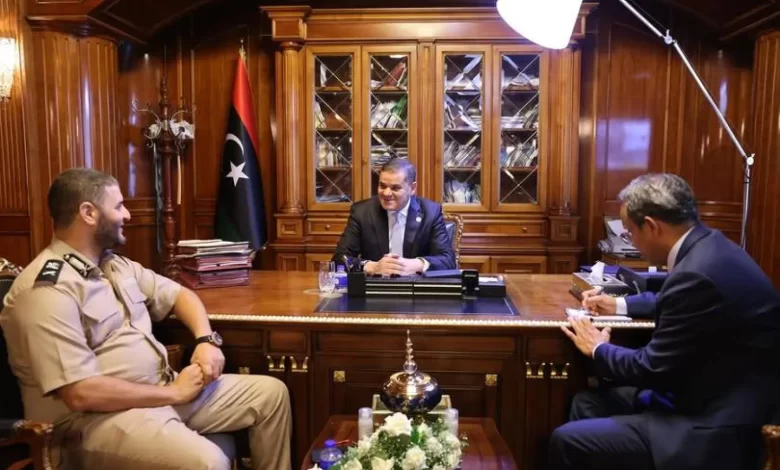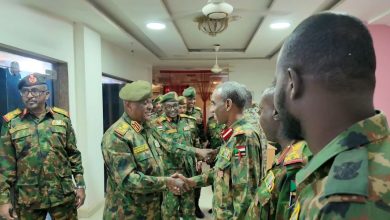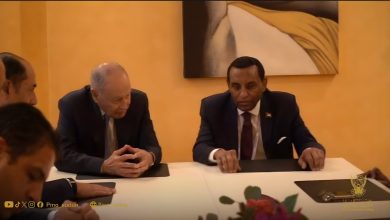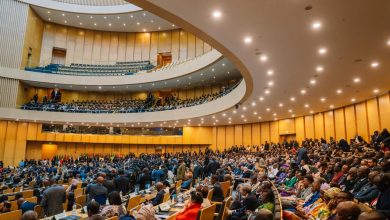InternationalNews
Libyans Question the Legitimacy of “Militia” Legalization

Sudan Events – Agencies
The description of Libya’s interim Prime Minister, Abdul Hamid Dbeibeh, calling his interior minister designate, Imad al-Tarablsi, a “former militia leader,” sparked widespread reactions across social media platforms last week, opening the door to questions regarding other militia groups and their official stance.
While many Libyan political observers agree that Dbeibeh’s comments about Tarablsi were an attempt to justify and defend him, noting his militia background, the debate has reignited calls for the integration of militia leaders into the security and military institutions.
In this context, Libyan political activist Hussam al-Qamati pointed out that Dbeibeh’s remarks and defense of Tarablsi “raised questions about the necessity of reviewing the policy of hiring unqualified figures within state institutions, to avoid the controversy triggered by Tarablsi’s remarks on the veil.” He also noted that these remarks had recently led to “threats against women who do not wear the veil.”
Al-Qamati added that Dbeibeh’s statement “raised questions about his failure to address the issue of militias in the field, or to start tackling the problem by disbanding them and reintegrating them on a professional basis.”
Dbeibeh had earlier stated that his government “is still working on resolving the disputes and clashes between armed groups,” stressing that “pressure continues to rehabilitate our armed youth, even if we grant them ranks, with the goal of protecting the country and fighting crime. Some of these youths are now ministers,” implicitly referring to Tarablsi.
Dbeibeh’s remarks defending Tarablsi and other militia figures triggered criticism of the prime minister on social media, with some accusing him of appointing “militia leaders” as ministers, while others questioned how military ranks and important responsibilities were being given to individuals still undergoing rehabilitation.
Political activist Ahmed al-Tawati argued that Dbeibeh’s cancellation of the controversial remarks made by Tarablsi “indicates his awareness of a mistake in them and in Tarablsi’s policies, and that he does not intend to retract his policy of legalizing militias and their leaders.” Al-Tawati told Al-Sharq al-Awsat, “Unfortunately, Dbeibeh’s comments did not just treat Tarablsi’s remarks about the veil and ethics as a spontaneous comment, but also involved flattering other militia leaders by offering them opportunities to become ministers, like Tarablsi.”
Libya is currently divided between two competing governments: the “National Unity” government, led by Abdul Hamid Dbeibeh, and another government appointed by the parliament that controls the eastern and some southern regions, backed by the Libyan National Army under General Khalifa Haftar.
Al-Tawati criticized Dbeibeh’s attempt to “downplay the dangers of militias in the capital and other cities under his government’s control in the western region by talking about the low frequency of clashes between them, and that their rehabilitation process is ongoing.” He added that in recent years, there had been fierce clashes between these militias, resulting in civilian casualties and the blockade of neighborhoods, and said that Dbeibeh “is trying to justify Tarablsi’s failure to fulfill his repeated promises to remove militias and various security agencies from the capital.”
In this context, several human rights and political voices reminded Dbeibeh that Tarablsi is not the only former militia leader in his government, noting the presence of Deputy Minister of Defense Colonel Abdel Salam al-Zoubi and the Director of Military Intelligence at the same ministry, Major General Mahmoud Hamza.



